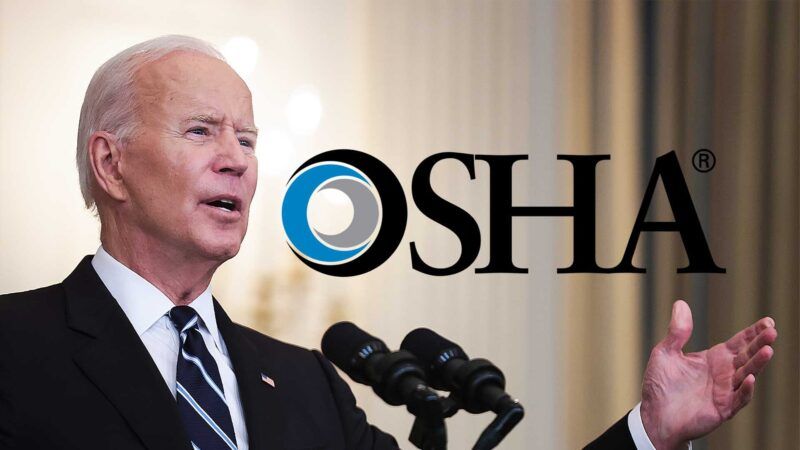Where Does Biden Get the Authority To Mandate Vaccination?
Emergency OSHA rules are frequently struck down by courts.

President Joe Biden decreed on Thursday that private companies with more than 100 workers would have to make it a condition of employment for them to get vaccinated—either that, or take weekly tests for the virus. You may wonder: On what authority can Biden order this?
The White House is relying on the regulatory authority of the Labor Department's Occupational Safety and Health Administration (OSHA), an agency dating back to 1971, and in particular its seldom-used emergency powers. Some backers of Biden's action seem to think waving in OSHA's general direction, together with citing COVID-19's high death toll, is all the answer needed to questions about legality.
But it isn't. Courts have frequently struck down OSHA actions, especially when the agency has tried to issue the type of peremptory decree it calls an emergency temporary standard (ETS).
A word is in order about the two ways OSHA adopts rules. The standard, accepted way is to put them through the process known as "notice and comment," building a record that it is hoped will result in more rational standards and, whether or not it does that, prepares the way for judicial review by, for example, putting the agency on the record against major objections as to its rationale for the rule.
The emergency process bypasses these protections for the regulated and for judicial review as a check. True, the process as foreseen is one in which OSHA is supposed to start developing a rule the regular way, which would at some point catch it up with the need to base its rules on a reasoned public justification. But that comes afterward. In the meantime it can use the excuse of emergency to regulate first and explain later.
To use the emergency decree power, according to the agency's website, "OSHA must determine that workers are in grave danger" and that an emergency standard "is needed to protect them." That is a vague and open-ended standard, but even so it opens up one set of possible challenges. Is a test-or-vax mandate that applies even to employees who work from home, or who have already contracted the virus and recovered, truly needed to protect other workers from "grave danger"?
Even when OSHA makes rules through its conventional process, there are real constitutional questions about the limits of its authority. In 2008, Harvard University law professor Cass Sunstein, who went on to serve as former President Barack Obama's regulatory chief, published an article entitled "Is OSHA Unconstitutional?" He addresses the problem of "nondelegation" arising from Congress' having seemed to bestow on the agency such wide powers, akin to those of a legislature, with so few checks. The Supreme Court has backed off since then on trying to breathe life into nondelegation doctrine as such, but Sunstein suggests that constitutional principle should at least call for close judicial review that would hold the agency to standards of rationality, consistency, and legality.
Another possible basis for challenge arises from the limits of the federal government's authority over interstate commerce, an area where, as in the Affordable Care Act individual mandate case, the Supreme Court's thinking has evolved since OSHA was founded. Yet another, which might rest on a statutory or constitutional basis, could arise from the decree's expected lack of provision for religious accommodation. Challenges on these grounds might or might not prevail. But if someone tells you that what Biden announced Thursday rests only on OSHA's accepted and uncontroversial legal powers, they're scrubbing away a whole lot of legal complication.
And that's all aside from the big legal fact here: Courts have applied tougher scrutiny to OSHA's emergency decrees than to its garden-variety rules. That is why a recently updated Congressional Research Service report on OSHA's ETS authority as applied to COVID-19 notes that the agency "has rarely used this authority in the past—not since the courts struck down its ETS on asbestos in 1983." (It did issue an ETS for healthcare workers and COVID-19 in June.)
As attorney Michael Schearer points out, of the nine times OSHA used its emergency power until this summer, three went unchallenged, but of the six that went to court, only one instance was fully upheld. All the others were stayed or vacated, in one instance partially. In other words, the courts have by no means been pushovers for OSHA ETSs.
And this makes sense. Ordinary OSHA rule making builds a detailed record and rationale, including time for objections, which allows judges to hold the agency to some semblance of legality. Emergency powers bypass that. Were courts to adopt a posture of abject deference to claims of emergency, they'd leave OSHA in a position to order around the nation by diktat.
In short, don't be surprised when the new Biden vaccine mandate ends up in court. Should it reach the Supreme Court, it will be amid fresh memories of the eviction moratorium debacle, in which a majority of justices clearly signaled that it would be unconstitutional for the Biden administration to renew the expiring Centers for Disease Control and Prevention decree, and the White House went ahead and did so anyway. Slapping that down took less than a month.
A lot of the blame here lies with past Congresses, which saw fit to arm this agency with grossly overbroad powers. How about we make it an agenda item for a future Congress to rein in OSHA's purported emergency powers to rule the workplace by decree?


Show Comments (180)